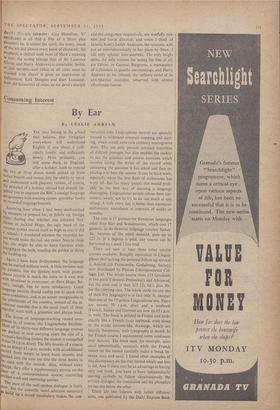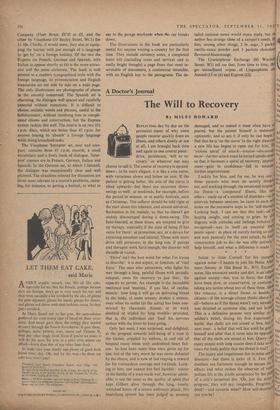Consuming Interest
By Ear
By LESLIE ADRIAN You may belong to the school that believes that foreigners everywhere will understand English if you shout it suffi- ciently loudly, and sufficiently slowly. More probably, you will come back to England, after a holiday, keen to expand the two or three dozen words picked up from notice boards and menus into the ability to speak and understand with pleasure (unless, of course, the prospect of a holiday abroad had already im- "Pelled you to augment the BBC's foreign language Programmes with evening classes, grammar books or recorded language lessons).
Knowing how often I had been disillusioned by attempts to prepare for, or follo.w up, foreign visits—finding that whether one attended 'live' classes or tackled Hugo, the ugly head of the Monster syntax reared itself as high as ever it did at school-1 wondered whether the recorded les- son would make the task any easier. Nice to think that one might be able to learn German while lounging in the bath, weeding the garden or doing the washing-up.
Again I have been' disillusioned. No language can be learned without work. A little revision may be painless, but the donkey work with gramo- Phone records is much the same as it ever was with Monsieur le professeur, or Herr Hugo. Re- sults, though, can be more satisfactory. Good language records should enable you to speak with some confidence, and in an accent recognisable to the inhabitants of the country, instead of the in- coherent mumble that is the usual result of three Months' work with a grammar and phrase book. The doyen of language-teaching record com- panies is, of course, the Linguaphone Institute. Most of its thirty-two different language courses are /Ie Packed in neat carrying cases the size of a woman's handbag (unless the student is compelled to use 78 r.p.m. discs). The fifty lessons of a course are on fifteen 45 r.p.m. records, with an additional , record from which to learn basic sounds, and Packed into the case are also the three books to be used with the records. Also, without extra barge, they offer a supplementary service on the lines of a correspondence course, correcting ritten work and answering queries. , The pace of the well-spoken dialogue is fairly low, but the scientific word selection necessary rbuild up a sound vocabulary makes the con- versation trite. Linguaphone records are specially treated to withstand constant stopping and start- ing, which would soon ruin ordinary microgroove discs. This not only permits constant repetition of difficult passages, but also enables the student to use the question and answer exercises which involve lifting the stylus of the record while answering the question it has asked and then re- placing it to hear the answer. It can be hard work, especially when the first flush of enthusiasm has worn off. But for many people this would prob- ably be the best way of learning a language thoroughly. Linguaphone people advise their cus- tomers, wisely, not to try to do too much at one sitting. A little every day is better than enormous enthusiastic marathons at intervals of weeks or months.
The cost is 15 guineas-for European languages other than Slav and Scandinavian, which cost 17 guineas, as do Oriental language courses. Icelan- dic, because of the small demand, goes up to £22 Is. If a deposit is paid, any course can be borrowed on a week's free trial.
There are now at least three other similar courses available. Roughly equivalent to Lingua- phone (but lacking the personal follow-up service) is Assimil (10 Farncombe, Godalming, Surrey), now distributed by Pitman Correspondence Col- leges Ltd. The whole course costs £14 (available in two parts if desired, Prelimina'ry and Advanced, but the total cost is then £15 12s. 6d.), plus 30s. for the carrying case. The whole outfit (in any one of their five languages) is in fact only 5s. cheaper than one of the 15-guinea Linguaphone sets. There are twenty 78 r.p.m. discs and a textbook (French, Italian and German are now on 45 r.p.m. as well). The book is printed in France and looks exactly like a French /ycee textbook, even down to the crude cartoon-like drawings, which are heavily 'humorous,' with typography to match. In the French course I encountered some confusion over liaisons. The book says, for example, nous aussi (phonetically, noozosi), while the French voices on the record carefully make a break be- tween nous and aussi. I found other examples of this discrepancy on the trial record which was lent LI me. And if there may be an advantage in having only one book, you have to have independently moving eyeballs to follow simultaneously the written dialogue, the translation and the phonetics set out one below the other.
There arc two courses with rather different aims, one published by the Daily Express Book
Company (Fleet Street, EC4) at £5, and the other by Visaphone (10 Bayley Street, WC1) for £3 10s. Chiefly, it would seem, they aim at equip- ping the learner with just enough of a language to 'get by' on a foreign holiday. Of the two the Express (in French, German and Spanish, with Italian to appear shortly at £6) is the more attrac- tive and the more elaborate. The book is well printed in a modern typographical style with the foreign language, its pronunciation and English translation set out side by side on a wide page. The only illustrations are photographs of places In the country concerned. The Spanish set is charming, the dialogue well spaced and carefully repeated without monotony. It is difficult to choose realistic words and phrases, useful to the holidaymaker, without involving him in compli- cated idioms and construction, but the Express system tackles this well. The course is on two 33+ r.p.m. discs, which are better than 45 r.p.m. for anyone hoping to 'absorb' a foreign language while doing household tasks.
The Visaphone 'Interpret' set, neat and com- pact, contains three 45 r.p.m. records, a small vocabulary and a lively book of dialogue. 'Inter- pret' courses are in French, German, Italian and Spanish. In the German set, to which I listened, the dialogue was exceptionally clear and well planned. The situations selected for discussion are those most relevant to a tourist's problems, camp- ing, for instance, or getting a haircut, or what to
say to the garage mechanic when the car breaks down.
The illustrations in the book are particularly useful for anyone visiting a country for the first time. They include currency notes, a completed hotel bill (including taxes and service) and (a really bright thought) a page from that most in- scrutable of documents, a continental timetable, with an English key to the pictograms. The de-
tailed national menu would repay study, but t author has strange ideas of a camper's needs. lists, among other things, 2 lb. sago, 5 packe vanilla-sauce powder and 3 packets chocolat flavoured blancmange.
The Gramophone Exchange (80 Wardo Street, WI) tell me that, from time to time, th get secondhand copies of Linguaphone aO Assimil (£5 or £6) and Express (£3).



































 Previous page
Previous page